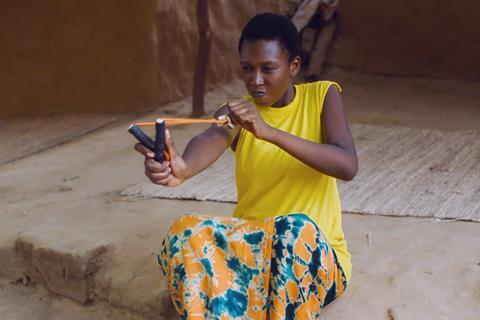Madness descends on a married couple’s domestic bliss in this debut Competition title from Senegal

Dir/scr: Ramata-Toulaye Sy. France/Senegal/Mali. 2023. 87mins
It’s a love that burns as brightly as the scorching sun of northern Senegal. It is also a love that has a destructive power that matches the sun’s relentless heat. Banel (Khady Mane) and Adama (Mamadou Diallo) have been married for a year, and they would spend every waking moment together if they could. But the conventions and responsibilities of their remote village community stand in the way of their plan to move to an abandoned house outside the settlement. The feature debut from Ramata-Toulaye Sy – the only first feature in Cannes’ main Competition this year – is perhaps not a strikingly original work, but this sparse, atmospheric fable grows markedly in power in the second half, as Banel’s passion takes on an edge of violence and insanity.
This sparse, atmospheric fable grows markedly in power in the second half
Sy, who is of Sengalese descent and was born and raised in France, set this Pulaar-language film in the region from which her parents hailed; her prize-winning 2022 short film, Astel, was also set in northern Senegal. Previously, Sy co-wrote Guillaume Giovanetti and Çagla Zencirci’s Turkish set drama Sibel (a prizewinner in Locarno and Adana film festivals) and co-wrote the screenplay for Atiq Rahimi’s Our Lady Of The Nile, winner of the Crystal Bear for best film in Berlin’s Generation14plus section in 2020. This is a promising debut for Sy, who combines an eye for arrestingly apocalyptic images – a flock of screaming birds that turns the sky black, a rolling wall of grit during a sandstorm – with skilful work with her non-professional cast. Banel & Adana should enjoy a warm festival reception and will likely be of interest to arthouse distributors in the market for fresh voices and African cinema.
But while the film is firmly rooted in Africa, classical literature has a clear influence on the story. Banel, with her festering ambitions and the destructive force of her love, could be seen as a descendant of characters such as Medea or Lady Macbeth. Yet Sy keeps her central character’s true nature hidden for the first half of the picture. We are introduced to a girl who shows her independence with her choice of clothes – with her hair cropped short, she has rejected the head scarves favoured by the other women. And she prefers to herd the cattle with her husband rather than to take on the women’s jobs – the laundry, the childcare, the fieldwork. With a drought placing further pressure on the couple, Banel becomes consumed with love for her husband.
There are hints of darkness in her soul, but nothing prepares us for a scene in which, talking to a nervous bride-to-be, she lazily dismisses all the other men as being interchangeable. Then, almost without pausing, she takes her slingshot and casually kills a songbird. It’s a remarkable performance from Mane, who conveys the mutinous, deluded anger in a young woman who would bend the world around her to her will if she could. And if she can’t, she’ll just destroy it, as several unfortunate lizards find out to their cost.
As Banel’s madness takes hold, and as the drought punishes the land, the use of music shifts too – the lush multi-instrument score of the early part of the film gives way to a slow, sullen pulse of a drum, a few desultory plucked strings. And the whispered mantra of “Banel and Adama” – a key component of Banel’s internal monologue – starts to sound more like a curse.
Production company: La Chauve-Souris, Take Shelter
International sales: Best Friend Forever, sales@bffsales.eu
Producers: Maud Leclair Névé, Eric Névé, Margaux Juvénal
Cinematography: Amine Berrada
Editing: Vincent Tricon
Production design: Oumar Sall
Music: Bachar Mar-Khalifé
Main cast: Khady Mane, Mamadou Diallo, Binta Racine Sy, Moussa Sow
























